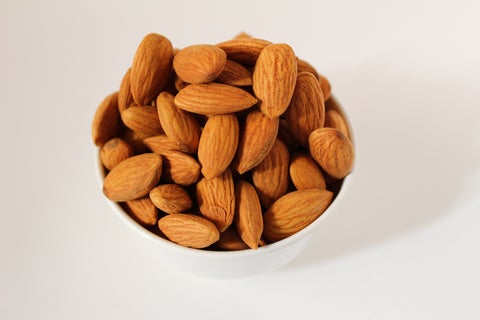11 Plant-Based CPG Ingredients to Target the Vegan Market
There’s never been a better time to get into the world of plant-based consumer packaged goods (CPGs). With booming sales and market value on the rise, the plant-based CPG market is more exciting than ever!
Kyle Gaan, a research analyst for the Good Food Institute, called 2020 a “breakout year for plant-based foods across the store.” Calling the growth in the market “incredible”, he said that sales surpassed expectations and was “a clear sign of where consumer appetites are heading”.
With 40% of US households now drinking plant-based milk, and one in six households purchasing plant-based meats, the stats say it all.
Vegconomist reports that “US retail sales of plant-based foods continued to increase in 2020, growing 27% and bringing the total plant-based market value to $7 billion”.
More and more people are switching to flexitarian, vegetarian and vegan diets
A plant-based lifestyle is good for people and even better for the environment. If you’re running a CPG business, it only makes sense to give the customer what they want: more plant-based options! So how do you do that?
In this article, we’ll explore some of the most popular and versatile plant-based ingredients you can work with to target the vegan market.
11 plant-based ingredients to target in the vegan market
Soy
Soy has always been one of the most popular vegan ingredients and is a staple for most vegan diets. Its ability to work as both a source of protein, a non-dairy milk, in vegan desserts (think chocolate mousse made out of silken tofu) and more, makes it one of the greatest all-rounders in the plant-based game.
There are a few different types of soy products, all made from soybeans of course, with tofu and tempeh being the most popular. Tofu is often used as a substitute for meat in dishes and can be super delicious when marinated. However, its distinctive texture doesn’t replicate meat in the same way that other plant-based proteins do. The fermented soybean product, Tempeh has a nuttier and ‘meatier’ texture and when combined with other ingredients, does a good job of replicating traditional meat.
Seitan
Seitan is wheat gluten. When vegos say “it tastes just like chicken!”, they’re probably talking about seitan. With a mild but savory taste and a texture that imitates meat well, seitan is often used as a replacement for chicken and as an ingredient in CPGs like plant-based sausages.
Pea

Pea protein is extracted from yellow peas. Not only is it a vegan option, but it’s also a great source of iron with plenty of health benefits. Healthline reports that “it can aid muscle growth, weight loss and heart health”.
One pretty famous example of how the humble pea is taking center stage as a great plant-based ingredient, is the Beyond Meat burger. The Beyond Burger mixes pea protein, mung bean, fava bean, and brown rice proteins, as well as cocoa butter, coconut oil, and canola oil to create burger patties that are nearly indistinguishable from their traditional counterparts. They even “bleed” like meat patties, but without any of the suffering!
Quinoa
It’s no secret that quinoa is all the rage at the moment, and for good reason. With 8 grams of protein per cup, it’s a great protein option for anyone looking for plant-based proteins. Even better, it’s low GI, gluten-free and contains all the essential amino acids you need, making it a complete protein.
Brown rice
Brown rice is less processed than white rice, making it higher in vitamins, minerals, and antioxidants. One cup of rice contains 3.5 grams of fiber, while white rice contains less than 1 gram. This can benefit heart health and aid in weight loss. Brown rice is also a naturally gluten-free option, which is great for people with wheat intolerances or allergies.
Linseed
Linseed is high in omega-3 fats, which is a great option for flexitarians, vegetarians, vegans, and anyone who doesn’t eat fish. Healthline reports that they’re a “rich source of alpha-linolenic acid (ALA)”, which your body doesn’t naturally produce. Studies have found that higher levels of ALA led to lowered risks of heart problems and strokes.
Oats
Last year oat milk overtook soy milk as the number two most popular plant-based milk, after almond milk. Oats are a gluten-free whole grain with a ton of nutrients, including vitamins, minerals, fiber, and antioxidants. Medical News Today reports that oats can help lower cholesterol, “may help reduce the risk of coronary heart disease” and colorectal cancer, and can aid in lowering blood pressure.
Mushrooms

Mushrooms are pretty incredible, and if you’ve seen the documentary Fantastic Funghi you’ll know why. They’re another popular ingredient found in plant-based meat alternatives as they have that distinctive umami taste that’s similar to meat. Plus, the variety of mushrooms out there means you can create a wealth of products with them — think pulled ‘pork’ with oyster mushrooms, ground ‘meat’ with shiitake mushrooms, and burgers using portobello mushrooms.
A great source of plant-based protein, mushrooms also contain vitamins, minerals, and antioxidants. The health benefits speak for themselves. The National Cancer Institute reports that “the antioxidant content in mushrooms may help prevent lung, prostate, breast, and other types of cancer”.
Coconut oil
Coconut oil has been popularized as a healthy fat. It’s been reported that it can boost heart health and promote fat burning. It’s also a frequently used ingredient in vegan baking, and plant-based cheese too. This is because it does a good job of mimicking the taste and texture of fats and it holds its shape when solidified.
Almonds and cashews

Almonds have tons of nutritional benefits, and are a key ingredient in any flexitarian, vegetarian, or vegan diet. Almonds are a great snack, either raw, roasted, or even smoked. In fact, Medical News Today reports that a handful of almonds contains 1/8th of a person’s daily protein needs. They can be scattered across salads, baked into nut roasts, or ground into flour for baking.
But almonds are also hailed for their versatility. There’s almond milk, almond oil, almond butter, and almond flour. So what’s all the hype about? Medical News today reports that studies show almonds can:
- Improve blood cholesterol levels
- Protect from the development of breast cancer
- Reduce blood pressure and improve blood flow
- Manage blood sugar levels
- Boost bone health
- Help manage weight
As for cashews, they’re often used in vegan baking and cheese making. You’ll find some delicious vegan cheesecakes using soaked and blended cashews, as well as fermented cheese using this milky nut as the base.
One example we love is Miyoko’s Creamery’s mozzarella. Made primarily with organic cashew milk, their mozzarella not only tastes great, but melts like real cheese too! This isn’t just a great option for vegans, either. People with lactose intolerances finally have some great options to indulge in, too.
Nutritional yeast
Nutritional yeast is a popular ingredient in plant-based cheese — if you’ve tried it, you’ll know it has a distinctive cheesy flavor. Because of this, it’s a popular (and vital) addition to vegan cheese sauces, can be found as a cheesy topping for popcorn, and mixed with nuts and seeds and turned into a vegan parmesan cheese.
Perhaps the name gives it away, but nutritional yeast is indeed, very nutritious! It’s a plant protein that contains all nine amino acids. Just one tablespoon contains 2 grams of protein, which makes it a quick way to boost a meal’s protein and flavor. That one tablespoon also contains 30–180% of the recommended daily intake (RDI) for B vitamins, and 2–30% of the RDI for trace minerals. These minerals include zinc, selenium, manganese, and molybdenum, which can boost immunity and metabolism.
Ready to break into the plant-based market?
At Buffalo Market, we’re all about CPGs that share our passion for the planet and people. We care about sustainability, organic production, and foods that nourish the body and soul. As we’ve explored, there’s a huge variety of plant-based ingredients that can be incorporated into existing and new products.
If you’re looking to branch into the vegan market, we want to hear from you — get in touch today to discover how we can help.


